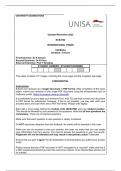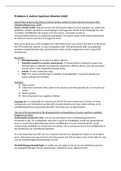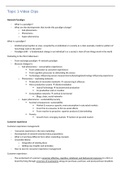WEAK
o At the start, he is presented as weak and immature – letting the suitors waste his oikos and cause disruption
helplessly -> ‘sitting troubled among the suitors’ – he imagines odysseus returned and getting rid of them
‘imaging how his noble father might arrive.. throw the suitors from the palace and win honour’ -> yet lacks the
courage and strength to do so himself
o He even doubts that he is Odysseus’s son -> we feel sympathy for him though, he has gone his whole life
without a father figure.
XENIA
o He Is great at giving xenia, we still him give xenia countless times -> a sure sign of his respect and piety to the
gods -> this is established early in b1 when he welcomes Athene, disguised as Mentes and sits her on a
‘handosme,richly carved chair’, and goes ‘straight to the door,a shamed a stranger should wait so long’ ->
servants give ‘plates of different meats’ ‘gold cups’
o HE offers odysseus the beggar xenia too, ‘fine tunic and cloak’ ‘double-edged sword’ and send him on his way.
o Morrison ‘Telemachus consistently displays flawless xenia’ -> ll presenting him in a positive light
MATURITY
o Telemachus is sent off on his own mini odyssey to manhood and maturation by Athene, to Sparta and Pylos in
books 1-4. -> metaphorical journey to manhood -> the end of the epic juxtaposes with how he was at the start
of the epic -> went from a weak, measly boy to a brave man, future king and hero
o We see this change at first in B1 after Athenes talk -> he tells Penelope to ‘go to your quarters.. attend to your
own duties at loom and spindle’, imperatives showing his dominance and new found manhood -> tells the
suitors to disperse the next day. -> scolds Penelope telling he to not tell the bard what to do and says ‘ I hold
authority in this house’
o Book 16 asserts to Penelope ‘my childishness is of the past’
o He notices Athenes presence after she leaves ‘awed realising a god had been with him’, foreshadowing his
maturity as being worthy of odysseus son! -> in Homer, gods only help those worthy of it and heroes. ->
paralleled in book 21 when he sends her upstairs in the archery contest
YET..
o We can question his maturity; he often still behaves and acts like a child. -> at the end of b1, eurycleia still sets
out his folded up tunic, closing his bedroom door.
o In Book 16, he tells Eumaeus ‘I am still young’ not strong enough to defend myself against anyone who picks a
quarrel’ -> presenting him as weak and childish even after his journey. Though he has learned about his fathers
heroism and leadership, he still isn’t ready to take on that role himself
o Still referred to with the noun ‘child’ and ‘boy’, and obeys Odysseus when he sends him to his room
o He is rude to Penelope in B23, not understanding why she is sitting paart from odysseus and failing to recognise
him -> lacks the patience which are vital to the charatcisation Penelope and Odysseus -> insults her that ‘your
heart is always harder than flint’ -> he doesn’t realise the sacrifices she has made for the last 20 years to ward
off the suitors to protect him from being killed -> when odysseus checks him he makes a witty comeback saying
that ‘they say you are the most resourceful of men’, so he should’ve thought that they killed the youth of Ithaca!
THE BOW
o The archery contest and the task of stringing the bow is also a challenge to Telemachus -> he tries 3 times to
string it ‘three times it quivered in his hands’ ‘made a fierce effort to string it -> yet he ‘might have strung it at
the fourth attempt had odysseus not shaken his head and checked his eagerness’
o The fact that he almost succeeds in stringing the bow is a symbol that he is yet ready to take on the burden of
leadership from odysseus but he will get there in the future, and is a future king, leader and hero. A contrast to
his weakness at the start
DISGUISE AND DECIET
o Telemachus takes on Odysseus’s role of being a master deceiver -> he must act like Odysseus has not returned
tohis mother, the suitors and everyone else. -> ‘I will not hide a single fact’










